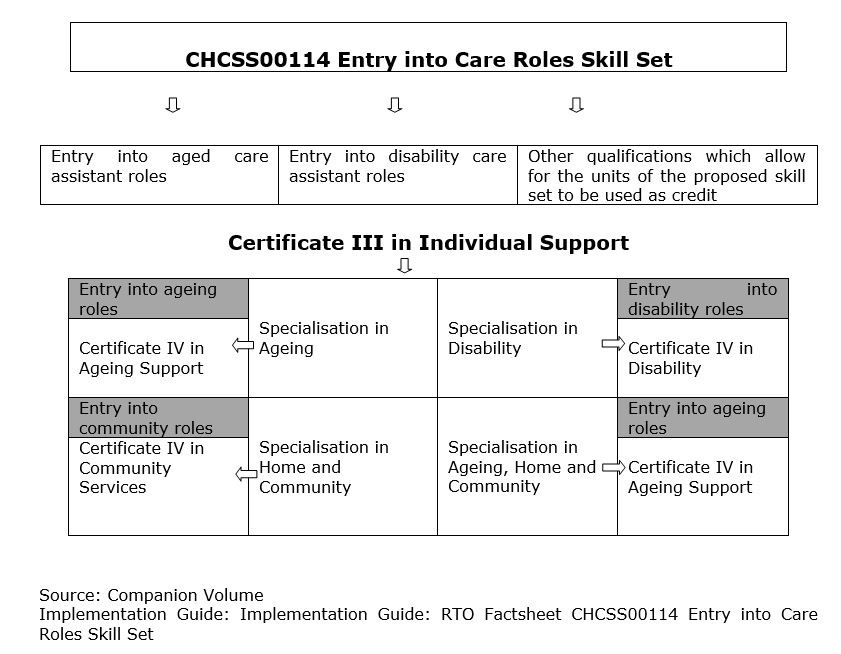This qualification is delivered over a period of 80 nominal hours comprising of classroom sessions* , supervised directed learning, skills training, self-paced learning, practical placement, assessment and assessment assistance. Students undertake a work experience/ practical placement experience of 40 hours.
*With the current pandemic situation, a number of classroom sessions will be delivered online to enhance safety of students and trainers.
Please note: The course duration may vary for individual students based on their current academic and work experience. All students will be assessed on an individual basis for their ability to meet the course requirements within an extended or reduced time frame.
Classroom based training (face to face/ online) and supervised practical experience in a community and/or residential setting.
Level 1/169 Plenty Road, Preston, VIC 3072 and Practical Placement location as negotiated.
This skill set addresses the skills and knowledge required to provide entry level support for basic client care for a range of roles and purposes required within the aged care and disability support sectors. The support provided in client care will be predominantly non-direct, with some basic direct client care, in order to maintain the safety of both the learner and client in care.
This skill set is for individuals who use introductory care practices to support fully qualified carers within an aged care or disability support environment. Candidates who complete this skill set would be equipped with the skills and knowledge required to undertake job tasks to support fully qualified carers, such as making beds, providing assistance to maintain a clean environment and communicating with carers as part of the support service.
As an entry level skill set, this training is aimed at people who have suitable attributes, but may not have had any work experience, in either the aged care or disability support sectors.
This qualification is beneficial for:
- People transitioning from other sectors impacted by COVID-19
- parents of young children
- young people seeking to enter the workforce
- people looking for a career change
- people wanting to develop new skills, or
- people who are interested in undertaking training but don’t want to commit to undertaking a full qualification such as a Certificate III or diploma.
ALACC entry requirements require that applicants must:
- Be at least 18 years’ old
- Have satisfactorily completed Year 11 or equivalent
The following are not an entry requirement, but may need to be considered prior to undertaking this course:
- Basic foundation skills and computer literacy skills may be required for learning activities related to the course. Where relevant, adequate student support is available.
- Fitness to undertake manual handling tasks and meet the requisites of the job role and other relevant industry standards is preferable.
- Students will also be required to provide a current Police check and evidence of flu shot prior to undertaking placements.
- Workers in disability support roles will need to complete the NDIS Quality and Safeguards Commissions worker orientation online training module ‘Quality, Safety and You’.
Please note: Proficiency in English is required to meet Industry standards.
Students will be undertaking Pre-Training Review and LLN test prior to enrolment. The LLN test is not an entry requirement, students are asked to undertake the same so appropriate academic support can be ensured throughout the course of study.
Students may be able to shorten the length of their studies through the recognition of past experience and/ or qualifications gained elsewhere. Applications can be made for Recognition of Prior Learning (RPL) and Credit Transfer.
These will be assessed according to the college’s policy & procedures and the context of this skills set to determine if/how much advanced standing will be granted.
This qualification holds National Recognition.
Assessments will be conducted to determine the achievement of competency-based learning outcomes. Assessments may include student questions, case study/ scenarios, practical skills observation and assessment (simulated environment/ practical placement) and post placement assessment.
To gain competency in this skills set, students are required to demonstrate their knowledge and skills through assessments in the workplace environment. Upon completion of the online/ face to face component of training, students can seek employment or work placement to undertake the practical aspects of the training. Students then complete the workplace assessment under the guidance of the workplace supervisor and the assessor.
Employment/ Placements may occur in aged care, disability, or other aged care and community settings in Melbourne or Regional areas as organised by ALACC and according to the course requirements.
While ALACC takes responsibility to provide work placements, students have the choice to find a work placement close to their place of residence. ALACC does not provide employment services.
All placement arrangements have to be approved prior to commencing placement. ALACC will negotiate and have an Agreement with the Placement Provider before the student attends work placement.
Please note: The cost for the practical placement is included in the fee. However, if a student does not attend the allocated placement then the student will have to pay for the costs set by the practical placement providers for cancelling their placements.
Placements dates will be provided by the placement provider and can be subject to change depending on the appropriate Placement Provider’s ability to take students at a specific given period. Students may need to be flexible with these dates and ensure they can attend the placements as soon as it is available.
Students will be required to attend pre-placement and post-placement sessions for assessment.
The units provide credit towards the Certificate III in Individual Support and other qualifications that allow for selection of these units.

This skill set will provide job seekers with the immediate skills required to gain employment in the aged care or disability support sectors and a pathway to a meaningful, long-term career. The aged care and disability support sectors will continue to need skilled workers into the future and this skill set will establish a strong foundation for a range of future jobs in the care and support workforce.
Please ask us about credit transfers.
Core Units
These units of competency from HLT Health and CHC Community Services Training Packages meet industry requirements for basic entry level care in aged care and disability support contexts.
The skills in this unit must be applied in accordance with Commonwealth and State/Territory legislation, Australian/New Zealand standards and industry codes of practice.

